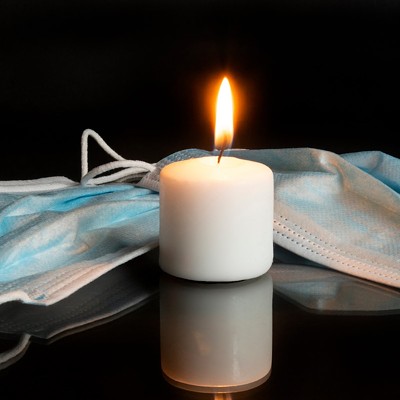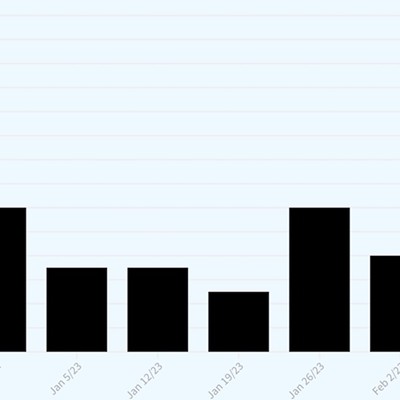- Provincial briefing hijinks—and tie-jinks
- Case numbers keep hitting milestones
- McNeil’s meme-making mic drop
- Community spread arrives
- Reaching seniors where they live
- When every school is a home school
- Ringing in the new fiscal year
Provincial briefing hijinks—and tie-jinks
Three weeks in, countless weeks to go, Stephen McNeil and Robert Strang show no signs of stopping. The premier and Nova Scotian’s chief medical officer of health don’t do give a COVID-19 briefing on Saturdays, but otherwise they’ve been there, webcasting daily from a well-lit room in downtown Halifax.
It can’t be easy. This week on The Steve & Strang Show show there were no guests—government ministers or public health doctors—to lighten the load on the hosts. Physical-distancing regulations caused the end, ages ago, of a live audience of journalists. Moderator Tina Thibeau got some relief in the form of her Communications Nova Scotia colleague Chrissy Matheson, who ran the Thursday and Friday briefings and will split moderation duties with Thibeau going forward. However, the focus remained on Strang and McNeil, giving their opening remarks then taking 30-or-so minutes of questions phoned in from reporters, before wrapping with McNeil’s monologue.
The whole thing is careful and official and deals with matters of life and death. Which makes the rare moments of unscripted humour all the more welcome. Strang almost never had a tie on at briefings, but this week he started wearing ties along with his blazer and button-up shirt. This trend started Tuesday, and McNeil noticed. "You’re looking pretty dapper today," he told Strang. "You’re making it tough on me."
Friday, Strang was talking about the importance of keeping families isolated together, avoiding contact with people outside their bubble, to limit the spread of the coronavirus. That includes being a buzz kill on teenage romance. McNeil happily picked up this thread. "Nova Scotia," the premier said, "you’ve heard it from doctor Strang: If your teenagers want to go see their boyfriend or girlfriend, blame him. You can say no." Then, to Strang, "I wish you'd been around when I had teenagers."
Case numbers keep hitting milestones
Although sports is cancelled, statistical excitement can be found tracking COVID-19’s accelerating spread. This week, the planet passed the one million cases mark. It took 130 days to reach 500,000 cases, from the first known case of the disease to March 26, and only seven days to infect the next 500,000 people.
Canada reached 5,000 cases this week, on Saturday, March 28—that took 68 days from the first case, in January. Then on Thursday—just five days later, the country passed 10,000 cases.
Nova Scotia also passed two milestones in one week: 100 cases on Saturday, then 200 cases the next Friday. It took the province 14 days to get the first hundred, six days for the second. This week the province unveiled a new web page with stats on hospitalizations, positive and negative tests, ages and genders of COVID-19 patients and a map of where cases are happening. (Not long after this recap, Nova Scotia would report its first coronavirus death.)
McNeil’s meme-making mic drop
You’ve probably already heard about "Stay the blazes home," the premier’s swear-adjacent demand for people to stop going out to socialize/spread disease. It spawned t-shirts, songs, even a virtual Coast cover harkening back to those simpler times—February—when people could go out and fearlessly pick something up with their hands.
The backstory is that Google is to blame. The giant advertising and surveillance company is tracking cell phones across the world to reveal how the coronavirus is changing people’s habits. McNeil saw the "COVID-19 Community Mobility Report" for Canada, and he was pissed.
Generally, the results show exactly what you’d expect given a lockdown: People are now in the "Workplace" and "Retail" settings less often than they used to be, and in "Residential" locations more. But when it comes to "Parks" the country is divided. In Quebec, visits to parks are down 68 percent; Ontario is down 14 percent; PEI is down 51 percent. But in BC, people are going to parks 27 percent more. Saskatchewan has a 45 percent increase. And here in Nova Scotia? Where Strang and the premier are constantly reminding us to remain at home? Where McNeil went mad dad and declared a state of emergency because we broke the rules about staying in? Where parks and beaches are closed.? Where cops can give $1,000 tickets if six people are standing together, apart? Where we walk to exercise, not to socialize?
Here in locked-down Nova Scotia we are going to parks almost twice as much—a 95 percent increase—as before COVID hit. And McNeil isn’t having it.
"I am so tired of hearing of grocery stores, Walmart, Tim Hortons parking lots filled with cars, as if we are not in the midst of a deadly pandemic. We are. To the reckless and selfish, I am talking to you," he said at the end of Friday, April 3’s briefing, building to a major mic drop to set the right tone for the weekend. "The virus will find you. Then it finds your loved ones, and then it finds your neighbourhoods. And then we have community spread. And then everyone is putting pressure on the public health to solve it, our health care system to deal with it and government to pay for it. When all we have have to do is stay the blazes home."
Community spread arrives
For a long time, we knew where every case of the coronavirus came from: either someone was travelling and brought it to Nova Scotia, or someone had contact with a COVID-carrying traveller. Even if a person with the disease didn’t know who they got it from, public health workers could trace their contacts back and figure it out. Strang calls this detective work "shoe-leather epidemiology," and it helps the province understand, even plan for, COVID’s spread.
The great fear is we lose track of how the disease is transmitted, resulting in "community spread." Unpredictable, often passed along before people even have symptoms, community spread is precursor to outbreak. And we avoided it for weeks. But Tuesday, March 31, it arrived; one case that no amount of shoe leather could trace to a traveller or another known COVID-19 patient.
"This does make me nervous," Strang said at the Wednesday briefing. "I didn't sleep well last night, thinking about this." The possibility of community spread makes Nova Scotia’s virus-inhibiting measures—frequent hand washing, standing apart from others, staying the blazes home—more important than ever. "The next few weeks are critical."
He returned to this theme on Friday. "We just have to be honest with ourselves. We have to look around the world and across other jurisdictions in Canada," Strang said. "In every jurisdiction in Canada, it started with introduction from travel. And then that went along for a period of time and then you start to see indications of community spread and now in BC and Ontario, Quebec, they have widespread community spread. So let's not be naive and expect that's not going to happen. But what I want people to understand is that how much that happens and how bad it gets is actually what is within our control."
Reaching seniors where they live
It’s been an especially long pandemic for seniors in retirement homes and other long-term care facilities. The province’s LTCFs were closed to visitors back in the middle of March, as one of the very first measures to limit COVID-19 exposure and spread. A smart move considering older patients are at a high risk of severe complications from the disease, although the reduced family time was clearly a strain: McNeil started this week with a promise to put hundreds of iPads into LTCFs to allow virtual visits.
But after that, things quickly got worse. Saturday the province announced that two facilities, R.K. MacDonald Nursing Home in Antigonish, and Lewis Hall in Dartmouth, each had an employee test positive for COVID. Sunday, a "non-resident" at The Magnolia in Enfield tested positive. Wednesday it had spread to two of the resident seniors and three staff at The Magnolia—transmission was eventually tracked to a training session for employees and what Strang called "a family gathering on March 11 at that facility that brought out-of-province visitors."
As the week ended, a reporter asked Strang what he’d tell people who think their relatives would be safer back at home instead of in an LTCF. Strang explained that care facilities have a capacity to provide health services that families typically can’t, and that screening protocols for care workers are being beefed up. "So I would not encourage people to be looking to take their relative home from a long-term care facility." The Magnolia’s case count was steady at five.
When every school is a home school
Monday was a good news/bad news kind of day for students who are enjoying their schools being shut down. The good: School buildings are officially closed until May 1 at the earliest, exams are cancelled and if you were "on track" to pass this grade before the coronavirus, then you pass. The bad: Virtual school is in session!
The province’s Learning Continuity Plan will be delivered by a mixture of online tools and hard-copy "learning packages" that the Chronicle Herald’s parent company is distributing. Students from Primary to Grade 6 are expected to do five hours of work per week, assigned by teachers and facilitated with help from parents and/or guardians. Junior high students get 10 hours of weekly work, and in high school, students will be assigned three hours per course per week. "These are extraordinary times that require new ways of teaching and learning," is the way the provincial education department puts it. Parents can prep for their new roles via the province’s curriculum site. And if teaching, learning, accessing the internet and otherwise running a home school is daunting? "Families who feel at-home learning may be a burden are asked to speak to their child's teacher."
Ringing in the new fiscal year
The city, the province and the country each mark the end of their financial year March 31, so the new year kicks off on April Fool’s Day. Somehow this always seems fitting for government, although in the year of COVID-19, reality was playing the biggest prank. Ha ha nature, you really got us.
"We came into this with a healthier economy than most Canadian provinces," McNeil said when the subject of budgets came up at the Wednesday, April 1 briefing. "We are putting in place steps that allows our economy to take off whenever this is over." (On that subject, Strang said "this isn’t just a two-week phenomena, it’s a number of weeks, six, eight to 10 weeks at least." What a joker!) At another point, McNeil did his best Captain Obvious impression when talking about the province’s budget plans: "While we try to build in capacity, flexibility, I would say to you this year, all of that will be tested."
April 1 also featured a ridiculous situation around the minimum wage. It went up a dollar, to $12.55 an hour, which is great for workers. But the societal lockdown and accompanying economic slowdown isn’t so great.
Luckily April Fool’s Day and its mixed messages ended, clearing the way for McNeil to announce millions in spending to bolster Nova Scotian economics. "Our small businesses and the self-employed have always been the backbone of our economy," he said. "But now with COVID-19 being here, layoffs and closures have slowed the pace of our economy. People are scared and we want to try to reduce some of that fear."
Two programs account for most of the spending. The "worker emergency bridge fund" is $20 million "to help the self-employed and those laid-off workers who do not qualify for unemployment insurance. We'll provide a one-time $1,000 payment to bridge the gap between the layoffs and closures and the federal government's Canada Emergency Response Benefit. The goal is to get the money into the hands of the impact workers as quickly as possible."
Similarly, the "small business impact grant" is another $20-million fund intended to give qualifying small businesses up to $5,000, cash that"can be used for any purpose," said McNeil. "The goal is to begin processing applications early next week, to get the cash out the door as quickly as possible. Information on where and how to apply will be made available at novascotia.ca/coronavirus."

















